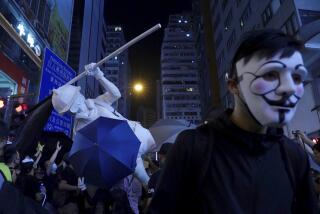Chinese Business Leaders Tout Positive Image of Post-1997 Hong Kong : Foreign investment: Visting group says the colony’s economic climate will remain robust.
- Share via
Hong Kong cardiologist Raymond W.Y. Wu quickly sums up the difference between his view of life after 1997 and the one held by Gov. Chris Patten, the outspoken official who has become a controversial advocate of democratic reforms in the last days of British rule of the Asian financial capital.
“That is the past. We are the future,” said the president of the Hong Kong Medical Assn., who is among those caught up in a feud between the Chinese and British over Hong Kong’s future.
Wu was among prominent Hong Kong business leaders who accompanied Lu Ping, China’s top official on Hong Kong affairs, to Los Angeles on Friday to bring Americans a different view of the British colony’s future after its return to Chinese control in 1997.
Whereas Hong Kong’s British officials regularly visit the United States, this was the first visit of the Preliminary Working Committee, a joint Hong Kong-Chinese advisory body established by the Chinese government in 1993. The group’s tour also included stops in Seattle, New York, Washington, Chicago and Boston.
Lu, the deputy chairman of the PWC and director of the Hong Kong and Macau Affairs Office of China’s State Council, has been locked in a verbal sparring match with Patten over Hong Kong’s future since the British governor took office in 1992. Critics describe the PWC as a mouthpiece for the Chinese government.
Patten has pushed for political and judicial reform designed to enhance Hong Kong’s autonomy before the transition of power.
But Lu’s supporters said the people of Hong Kong and the Chinese government--not the British--are in the best position to be the voice of Hong Kong’s future.
“For the first time I think the Hong Kong people’s voice is being heard,” said Gareth Chang, a longtime Hong Kong trader and a senior vice president of GM Hughes Electronics in Los Angeles.
The overall message offered last week by the PWC was clear: No matter what others say, China plans to keep its promise to uphold the 1984 Sino-British Accord that guarantees that Hong Kong will retain its social and economic autonomy for 50 years after the transition.
Lu said he was in Los Angeles to dispel fears among American business people that could stifle investment into Hong Kong or China leading up to 1997. He sought to assure his American audience that it is in China’s best interest to maintain Hong Kong’s freewheeling capitalist environment, including the protection of freedom of speech and travel, the free flow of capital and goods, budgetary independence and a convertible currency pegged to the dollar.
In fact, he and other committee members predict there will be an even better international business climate after Hong Kong--which will be known after 1997 as a Special Administrative Region of China--does away with the vestiges of colonialism that gave special privileges to British subjects.
For example, Wu said, the present system allows British professionals, such as doctors and surveyors, to work in Hong Kong without getting the special certification required of other foreigners. Hong Kong officials are looking into adopting professional certification requirements based on international standards that treat all foreigners the same, even the Chinese.
Nellie Fong, a PWC member and managing partner in Hong Kong for Arthur Andersen & Co., said Hong Kong businesses can reap the best of the economic programs offered under the “one country, two systems” policy established by China.
For example, China agreed that Hong Kong businesses, although technically within China’s borders, will be able to enjoy the same tax benefits and special treatment as other foreign investors after 1997.
That is one reason Fong predicts Hong Kong will become an even more important springboard for foreign investors interested in doing business in China. She said that between 1978 and 1994, more than $300 billion was invested by foreigners into China, 40% of which came through Hong Kong.
More to Read
Sign up for Essential California
The most important California stories and recommendations in your inbox every morning.
You may occasionally receive promotional content from the Los Angeles Times.













